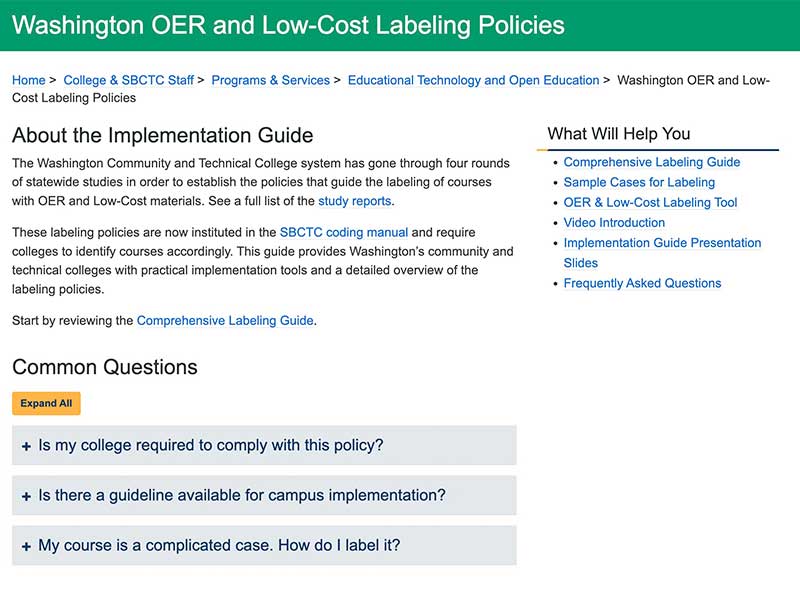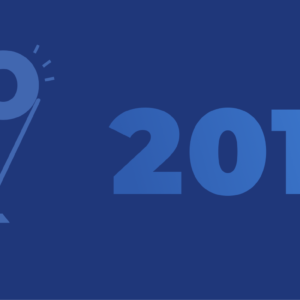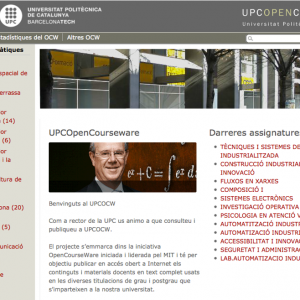Led by the Washington Community and Technical College Students Association (WACTCSA), with support from the Washington State Board for Community and Technical Colleges (SBCTC), the OER & Low-Cost Labeling Policies were legislated in 2020 (RCW 28B.50.789).
This was an outcome of a 4-year long statewide collaboration between Washington’s 34 community and technical colleges, a state government agency (SBCTC), and a student leadership association (WACTCSA) through multiple rounds of consensus-building processes. Since then the policy has been implemented in Washington’s 34 colleges, supporting students in making informed choices on at the time of course registration.
The Washington Community and Technical College Student Association played a pivotal role in promoting these policies by spearheading surveys that garnered an impressive response of over 10,000 student submissions within a mere two-month period. Furthermore, they proactively engaged with college leadership to discuss the policies and actively lobbied state legislatures during the legislative session for their support. By actively involving students in the policy establishment process, their unique perspectives and needs were given due consideration, ensuring that the policies align with the interests of those directly impacted by them. This student-led approach has truly set these policies apart and serves as a testament to their relevance and effectiveness.
The policy establishment process in Washington’s OER and low-cost policies employed a data-driven approach to foster consensus among system colleges. It involved four rounds of statewide surveys conducted to inform and refine the policy guidelines. These include the 2015 statewide surveys that identified the need for an O.E.R. labeling system through a qualitative study, the 2016 statewide research that surveyed faculty and administrators to develop O.E.R. Labeling Policy Guidelines, the 2018 student survey that received an impressive 10,050 responses and identified the Low-Cost Threshold, and the 2019 statewide research that surveyed faculty to develop and further refine the Low-Cost Labeling Policy Guidelines.
Washington’s OER and low-cost policies prioritize implementation, ensuring that the proposed policies are not merely theoretical but are put into practice. A comprehensive suite of professional development resources was provided, including a comprehensive implementation guideline with definitions, criteria, and sample cases, as well as professional development tools and resources. In addition, a college coordinators’ group was launched, connecting monthly to discuss the issues and share ideas. This commitment to implementation ensures that the intended benefits of the policies are realized, making them valuable for students and the educational system as a whole.
Washington’s OER and low-cost policies are designed to be regularly evaluated and monitored. The Washington State Board for Community and Technical Colleges, a state government agency that supports Washington’s 34 colleges, is tasked with monitoring and supporting the evaluation and pulling annual usage data for reporting and sharing. Recent data shows that Washington colleges have saved over 14 million dollars over the past two academic years.
By incorporating factors such as student-led policy establishment, data-driven consensus building, effective implementation, and evaluation, Washington’s OER and low-cost policies exemplify a comprehensive and strategic approach to improving equitable access, affordability, and educational quality for students. What sets these policies apart is not only their establishment but also their successful integration into the administrative systems of all 34 colleges. This demonstrates a noteworthy achievement, as the policies have moved beyond the mere establishment and have been fully embraced and integrated into the regions’s educational landscape.
First and foremost, Washington’s OER and low-cost policies boast a remarkable achievement: they were driven by students themselves.
Award Nominator
Put simply, this is what OER policy should look like. This is a student-driven effort to institutionalize support for OER, informing students which courses use OER and what that looks like in practice. I would love to see my institution do this.
Award Reviewer
/



